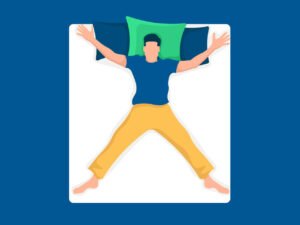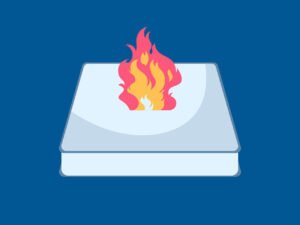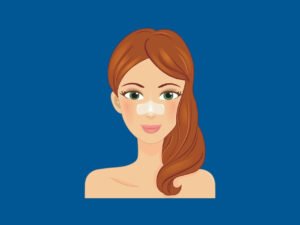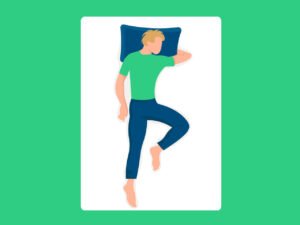If you keep waking up at 3 am or any other hour in the middle of the night, it might be the reason why you feel so tired in the morning, even if you have slept for at least 6.5 hours.
Waking up in the middle of the night is not that big of a deal if you fall asleep again right away (you probably won’t even remember that you woke up in that case).
But if you are reading this article, I guess you are also having a hard time falling back to sleep again, just like I used to be.
So here are some common causes that keep waking you up at 3 am and scientifically proven hacks to fix them:
Contents
This Annoying Thing Might Wake You Up Without You Even Realizing It
Noises can harm your sleep even if you are not consciously observing them.[1]
In addition, sometimes you wake up because of noises, but by the time you are fully awake, the noise has stopped already, so you are not aware of it.
Soundproofing your bedroom will minimize the frequency of being woken up in the middle of the night by nocturnal noises.
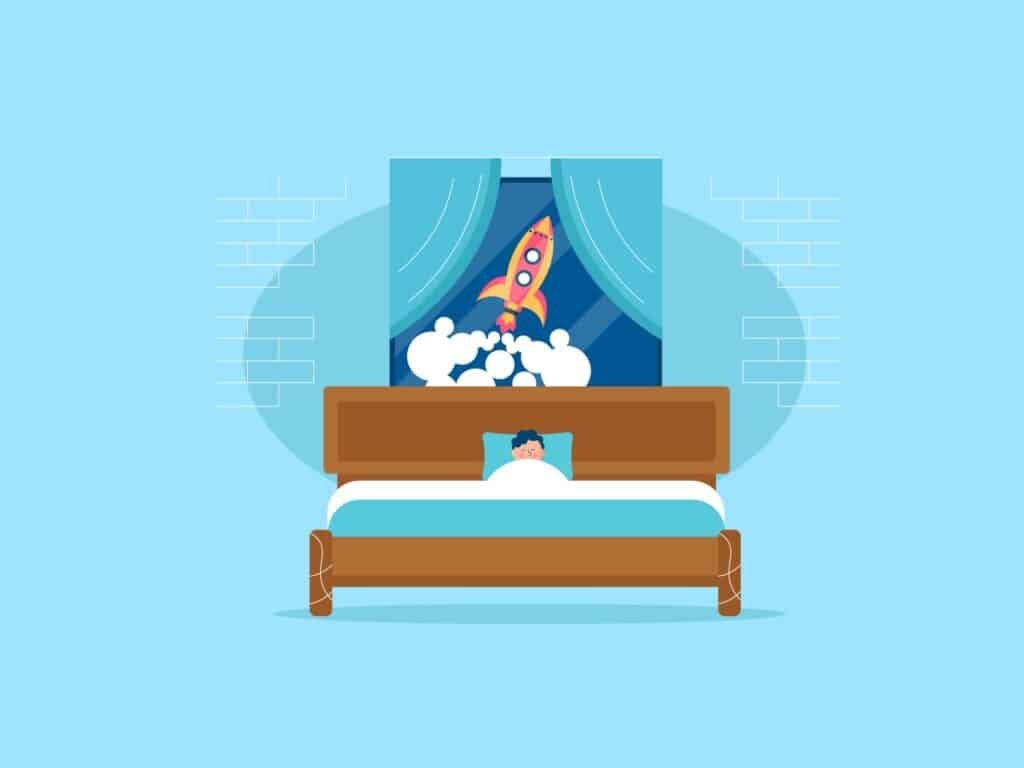
A double-pane window with a uPVC frame is the best window to block noises from the outside.
It’s a window made of two panes of glasses separated by air or gas.
Combined with a uPVC frame, it reduces the volume of noises coming from the outside significantly.
Obviously, the double-pane window has to be close during the night to be effective, which will make your bedroom feel unventilated.
But don’t worry, you can ventilate your bedroom easily by using sleep-inducing plants and/or an air ionizer.
For example, putting Sansevieria trifasciata and Zamioculcas zamiifolia plants in your bedroom can remove more than 95% of pollutants within 48 hours.[2]
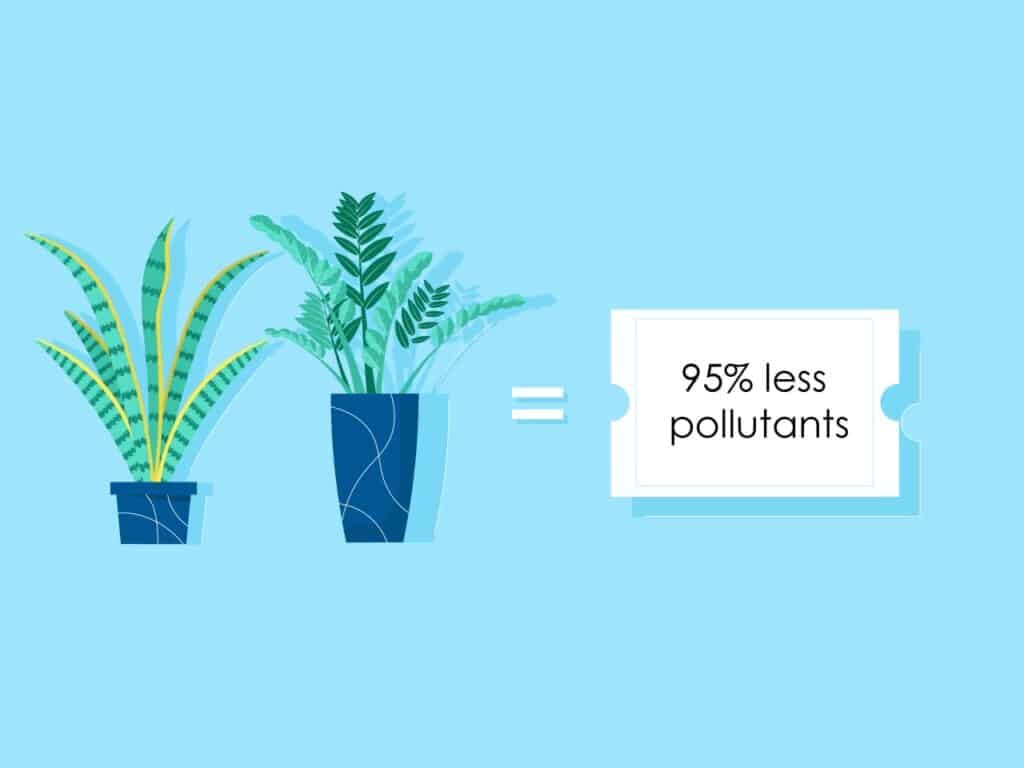
In case there are noises coming into your bedroom from the inside of your house, soundproof your bedroom door.
Let’s take a look at 9 ways to do that:
Unfortunately, some noises will be able to enter your bedroom no matter what.
In order to mask those types of noises as much as possible, I play white noise during the night.
It sounds like the noise of the plane, fan, generator, etc.
You can play white noise using a white noise machine. There are also many free apps in the app store that play white noise.
The white noise can also help you fall asleep faster[3] and improve your sleep quality[4][5].
Don’t Drink or Eat 90 Minutes before Bedtime
I used to drink water 30 minutes before bedtime in order to stay hydrated through the night.
As a result, I woke up in the middle of almost every night, feeling that I have to pee.
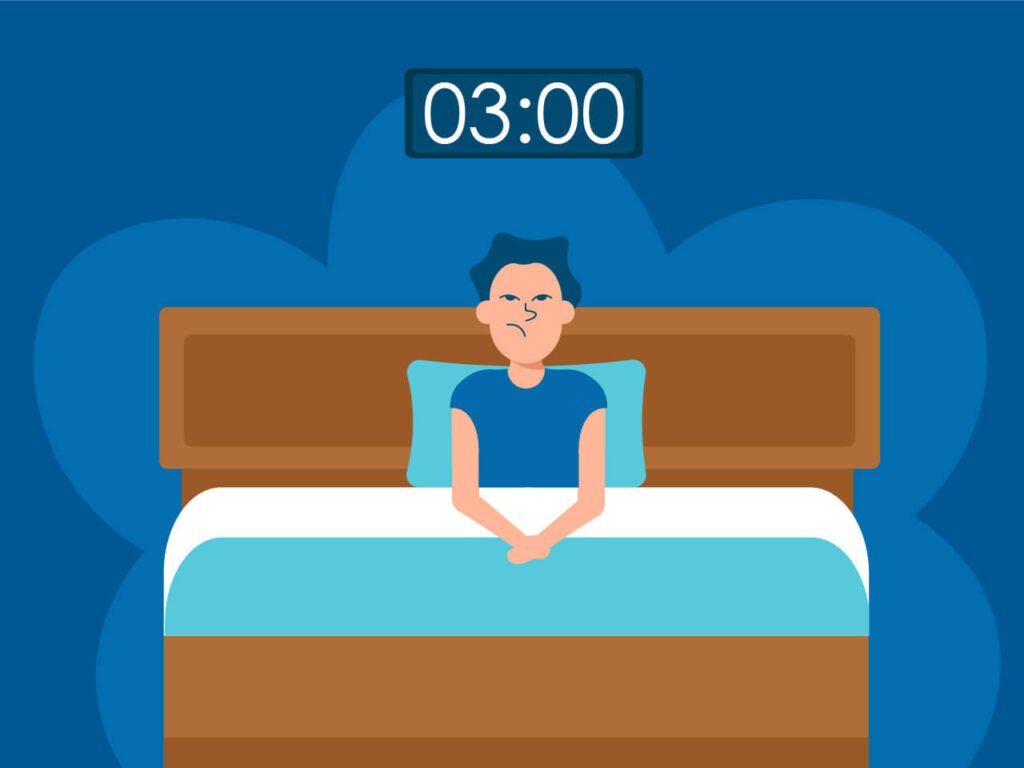
So I did an experiment:
I stopped drinking and eating anything 90 minutes before bedtime and since then, I do not wake up in the middle of most of the nights.
Even when I do wake up, it’s something like 30 minutes before the time I’m supposed to wake up anyway.
Which is much better than waking up in the middle of the night and then trying to fall asleep again.
If you think that you must drink before bedtime in order to stay hydrated through the night, let me calm you down:
The Muslims don’t drink or eat anything in the daytime during the holy Ramadan month. The Jews don’t drink and eat anything for 25 hours during Yom Kippur.
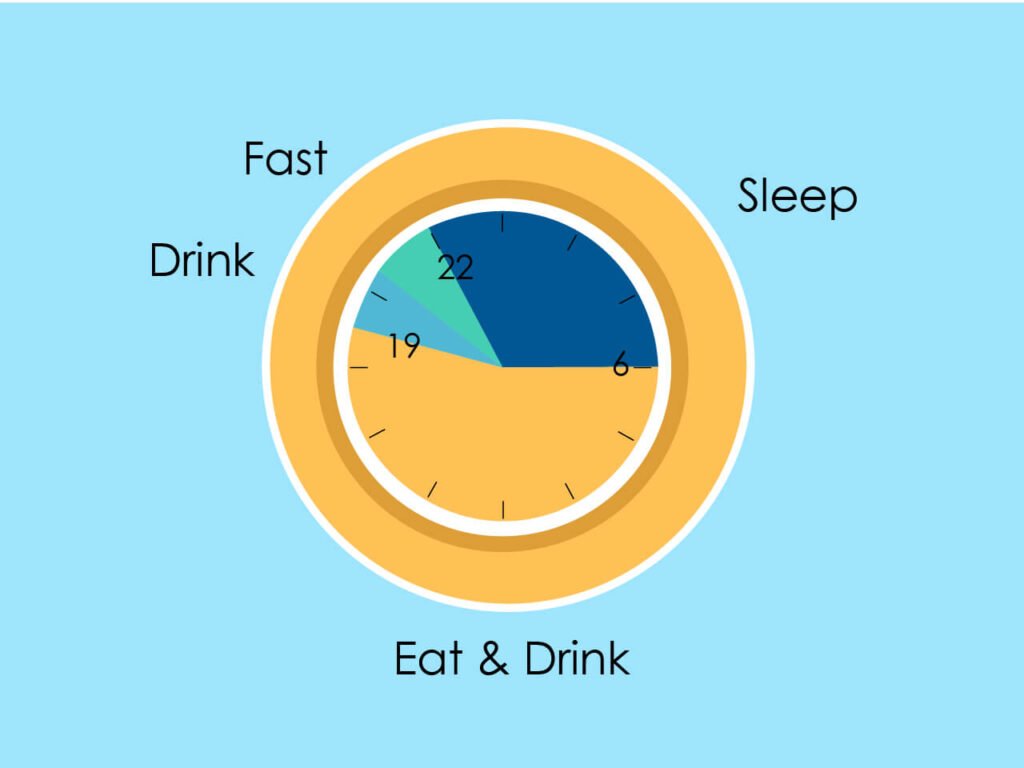
So unless you have to drink or eat right before bedtime for a medical reason, I think you should give it a try.
Just make sure you drink enough during the day.
Drink at least 8 glasses of water and make sure your urine is not too dark.
You should also make sure that you minimize the amount of liquid you lose during the night.
In order to minimize the amount of liquid you lose during the night you should:
Avoid Night Sweating
Bedrooms that are too hot will not only drop your sleep quality but also make you sweat during the night, which might cause you to wake up at night feeling thirsty.
In order to avoid night sweat during the hot summer nights you should:
- Set the room temperature to 15 – 20 degrees Celsius (60 – 68 degrees Fahrenheit).
- In case you can’t use air conditioning, you can put a bowl or two buckets of ice in front of a fan.
- Use Moisture-Wicking Bed Sheets.
- Wear a baggy pajama made of cotton or bamboo, or sleep naked.
Decrease Your Water Loss by 42%
A study showed that mouth breathing increases your water loss by 42% in comparison to nasal breathing.[6]
There are many additional ways that mouth breathing is sabotaging your sleep, but I need a full article (which I will write in the future) to mention all of them.
The problem is that many people are having a hard time breathing through the nose.
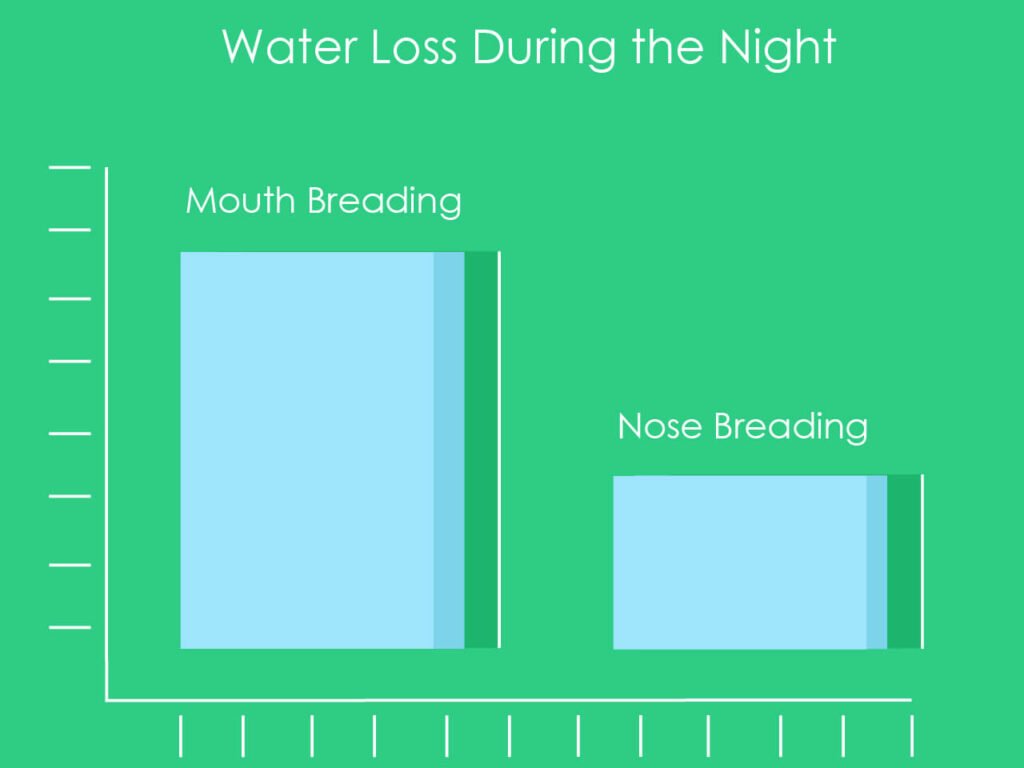
The good news is that most people are able to train themselves to breathe through the noise easily.
There is a great book with outstanding exercise programs to turn you from a mouth breather to a nose breather.
The author of this book, Patrick McKeown, also has a YouTube channel with a lot of awesome free content, called oxygen advantage.
Take a look at this video from his channel:
I listened to the audible version of the book and I can’t describe in words how implementing the techniques I learned from it have improved my sleep quality and energy levels.
Since I didn’t have enough time to exercise the full program (one hour a day), I did what I could during my daily activities (showering, training, walking, etc.).
Within a few months, I was able to do all my heavy training (HIIT, Powerlifting, Tabata) with my mouth closed.
My mouth is still getting wide opened when I’m in a deep sleep state, so I need to use tape to keep my mouth close when I sleep.
Some important notes about using a tape at night:
- IMO, you shouldn’t use tape to keep your mouth close at night until you are able to breathe easily from your nose during the day.
- Don’t use any lubricant on your lips such as Vaseline or Chapstick before mouth taping.
- Don’t use types of tapes that are not able to stay on your lips during the whole night. I used a very cheap type once and found myself chewing it while half sleeping. Be careful!
Here are some more tips about mouth taping at night and why it is important by doctor Burhenne from AsktheDentist.com:
Now I can wake up in the morning without a dry mouth and without a bad breath.
Try Those 5 Simple Tricks to Improve Your Sleep Quality
Insomnia and poor sleep quality might cause you to wake up in the middle of the night.
So let’s look at 5 easy techniques you can do today to increase your sleep quality and boost your energy levels:
1. Fall Asleep 35% Faster
According to a study, eating 2 kiwi fruits an hour before going to bed for 4 weeks can make you fall asleep 35% faster and improve your sleep quality.[7]
Since Kiwi contains a lot of water, in my opinion, it will be better to consume it 90 minutes before bedtime to avoid the need to pee in the middle of the night.
You can learn more about types of food that help you sleep in the article: 9 Foods That Make You Sleepy.
2. A Hot Bath + Lavender = Relaxed Sleep
As part of your circadian rhythm, your core body temperature should get a little bit lower in order to help you fall asleep.
A hot bath, 90 minutes before bedtime helps you to achieve exactly that.
Your body temperature increases during the hot bath and 90 minutes later crushes to a little bit lower temperature than your normal core body temperature.
In order to enhance the relaxing effect of a hot bath, add a few drops of liquid lavender essential oil in a carrier oil and/or magnesium flakes.
If you want to learn 9 more techniques that will help you to cope with stress and to go to sleep more relaxed, I recommend you to check the stress management plan.
3. Increase Your Sleep Hormone Production by 80%
Exposing yourself to blue light at night might decrease your melatonin hormone production by 80%. [8][9][10]
It’s the light that comes from the screens of your TVs, smartphones, and tablets, etc.
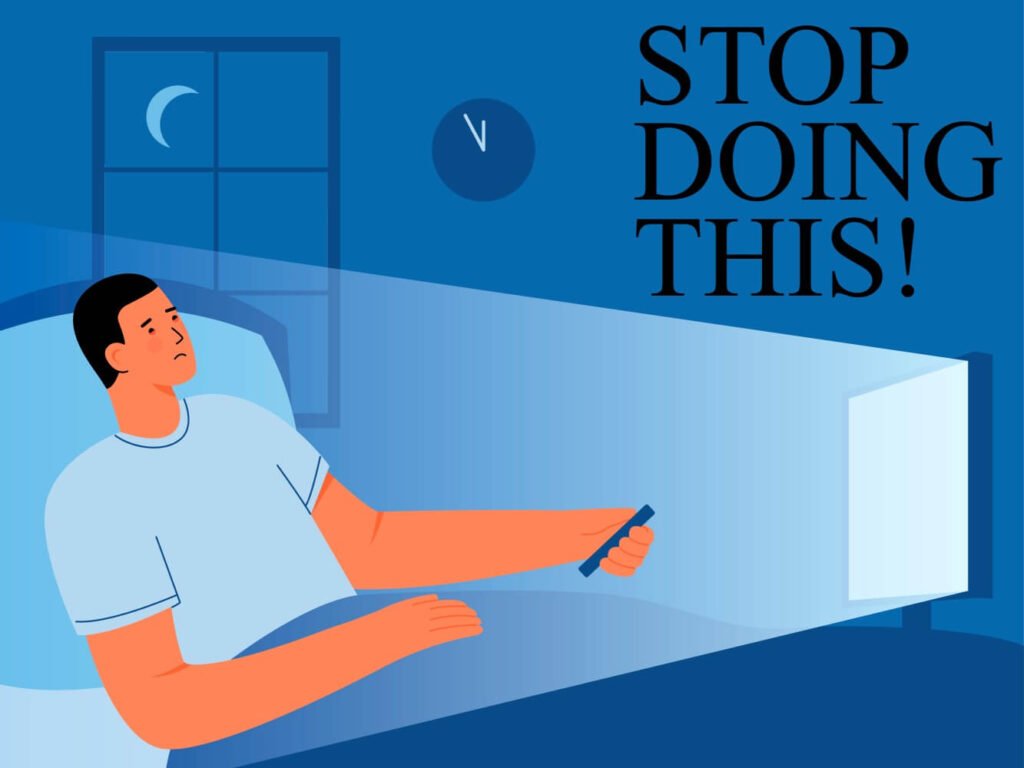
Yellow and white LED bulb lights also decrease melatonin production.
Tonight, one hour before bedtime, turn off all the lights in your house and use candles or a Himalayan salt lamp instead.
You will thank me in the morning when you feel way more energetic than you used to feel.
To learn more about the best light sources for sleep, read the post: What Is the Best Light for Sleep.
4. Play Sounds of Nature
In a study, participants who listened to the sounds of nature at 60 – 70 decibels had a better sleep quality than the control group.[11]
Nature sounds include a variety of wind, rain, ocean, birds, waterfall, forest, and river sounds.
In order to learn 5 more types of music and sounds that are scientifically proven to improve sleep quality, read this.
5. Declutter Your Bedroom
Your brain should associate your bedroom with sleep and sex only.
Anything that doesn’t support this should get out of your bedroom.
3 common types common sleep-disturbing objects are:
- Any art decoration that doesn’t create a relaxing environment.
- Mirrors that reflect your bed (might reduce your energy according to feng shui).
- Unused clothes.
To learn more about how to optimize your bedroom to improve your sleep quality, read this post.
Check Your Glucose Levels
Since we are fasting when we sleep, our blood sugar levels drop during the night.
For some people, the blood sugar level might drop below a normal level. This condition is called hypoglycemia.
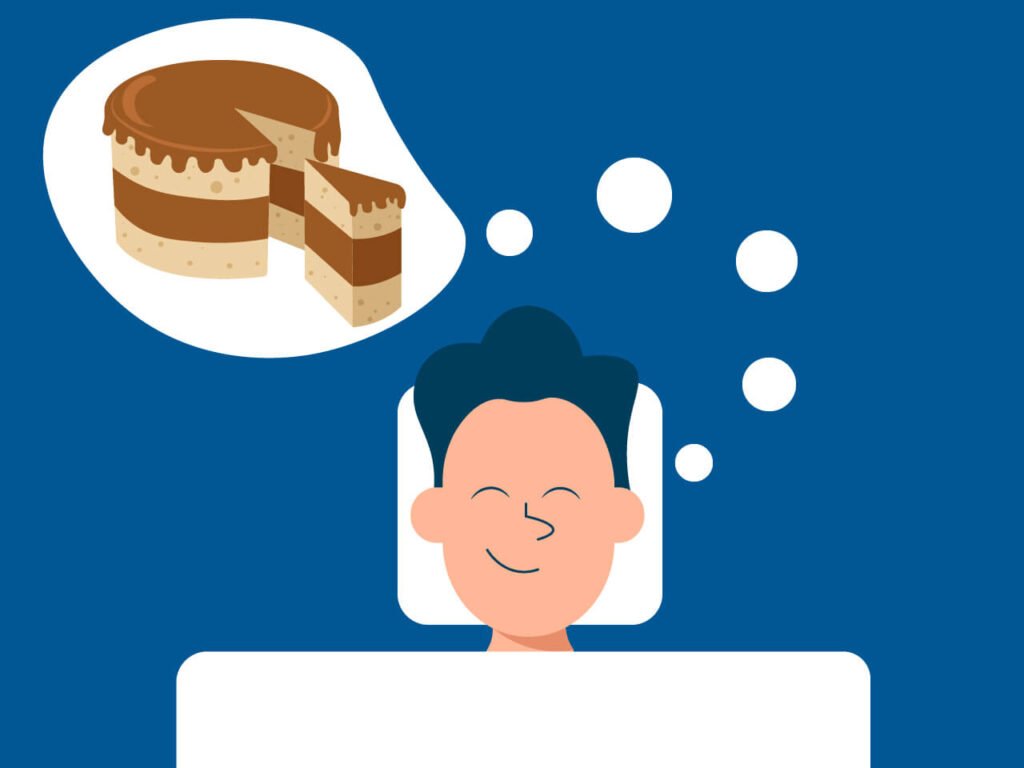
Researchers found that hypoglycemia can wake up most people in the middle of the night.[12]
People who suffer from type-1 diabetes are less likely to wake up due to hypoglycemia.
It puts them in danger because sleeping with hypoglycemia can be fatal.
Some of the symptoms of hypoglycemia are:[13]
- Sweating.
- Hunger.
- A fast heartbeat.
- Anxious.
- Dizziness.
However, you might wake up in the middle of the night due to hypoglycemia without any symptoms.
So if you keep waking up at 3 am, check with your doctor how you can diagnose whether you suffer from nocturnal hypoglycemia.
Your doctor can also give you some advice about how to prevent nocturnal hypoglycemia.
Some general advice is:
- Do not exercise intensely 3 hours before bedtime. A few hours after training, the blood glucose level might drop.
- Do not consume alcohol 3 hours before bedtime.
- Check your sugar levels before you go to sleep.
- Eat a high protein/low carb snack before bedtime.
If You Are A Shift Worker, Read This
Why does shift working harm your sleep?
A shift work sleep disorder, which is characterized by excessive sleepiness and disruption of sleep for at least a month, affects 2-5% of workers.[14]
Shift working disrupts your circadian rhythms, so in the middle of the night, your body might think it should be awake.
So what can you do about it?
Solutions for Shift Workers
Work on consistent hours as much as you can
Researchers found that individuals who worked 7 consecutive night shifts had a significantly better sleep quality than those who worked 4 consecutive night shifts.[15]
So instead of switching from day shifts to night shifts and vice versa every few days, work on night shifts for a month or two, and then work at least a few months only on day shifts.
Otherwise, when you go to sleep at night after you worked on a day shift, your body will wake you up in the middle of the night because it will think it’s time to work.
Rotate your shifts forward
If you have to do a rotation in your work shift, prefer to rotate the shift forward.
For example, if today you work from noon till the evening, tomorrow rotates to work a night shift instead of working a morning shift.
It will make it easier for you to fall asleep.
You can get more tips for shift workers in this article, where I dedicated a whole chapter for shift workers.
Breath Right
During the deep sleep state, the muscles at the posterior part of your tongue might become so relaxed that the posterior part of the tongue drops and blocks the airways.
This condition is called sleep apnea.
It is estimated that 22 million Americans suffer from sleep apnea.[16]
Some of the factors that might increase the risk of sleep apnea are:
- Sleeping on your back.
- Mouth breathing.
- Alcohol consumption at night.
- Obesity.
Two common symptoms of sleep apnea are snoring and daytime sleepiness even after 7 -8 hours of sleep.
In severe cases, one might wake up choking.
As a back sleeper, who also used to be a mouth breather, I used to have some of the sleep apnea symptoms, such as excessive daytime sleepiness.
As I mentioned before in this article, I switched from mouth breathing to nose breathing.
Since then, I no longer have any symptoms even though I still sleep on my back.

If you experience the symptoms of sleep apnea, you should consult with a doctor.
Before you meet the doctor, you can use one of the free apps that record you when you make noises while sleeping (search for “sleep recorder app”).
If you can play recordings of you snoring loudly, choking, or not breathing smoothly during the night to your doctor, it might motivate him\her to refer you to a sleep lab.
I also highly recommend reading the book: The 8-Hour Sleep Paradox: How We Are Sleeping Our Way to Fatigue, Disease and Unhappiness Paperback by Dr. Mark Burhenne
This is the best book about how to deal with sleep apnea I have ever read.
Two common symptoms of sleep apnea are snoring and daytime sleepiness even after 7 -8 hours of sleep. Share on XDo This to Fall Asleep (FAST) Again
In case you wake up in the middle of the night and want to fall asleep again as fast as possible, you can try one of the next techniques:
Brain tapping
This technique, invented by Jim Donovan, uses the fact that your brain tends to follow repeating rhythmic patterns.
What you are going to do is to basically create rhythm by tapping/drumming with your palms on your legs and after awhile, you will slow the rhythm down and your brain will follow.
Here is how to perform the brain tapping technique:
- Lie in bed on your back and close your eyes.
- Tap lightly on your upper legs with your palms at the rhythm of a ticking watch. A tap with your left hand, then a tap with your right hand, and so on.
- While tapping, breath in for 4 seconds, breath out for 4 seconds, repeatedly. Take breaks if you feel like you need to.
- Slow down the pace gradually so that after a few minutes you stop completely.
- Relax.
Some of you will fall asleep right away while others will need to exercise the technique a little more.
Clear your mind
If you find it hard to fall asleep because there are many thoughts or ideas on your mind, writing it down might solve it quickly.
The reason your brain is thinking about those things nonstop is that it thinks that if you fall asleep you are going to forget it.
Write it down and you might be shocked how easy it is for your mind to quiet down your thoughts.
Recreate Your Day Backward
Unlike the previous techniques that help to prevent you from overthinking and calm down your thoughts, this one is doing the opposite.
It helps me to fall asleep fast because it makes my brain work hard so I feel exhausted.
This is how you do it:
- Imagine all the things you did during the day in your head backward.
- Start from the moment you went to sleep at night and go back until the moment you woke up in the morning.
- Don’t rush it. It should take you at least 10 minutes.
- Skip only on details that create high emotions within you (which might make you feel alert).
Challenge yourself to stay awake during this exercise and to not fall asleep until you finish it.
It will prevent you from trying to fall asleep. From my experience, trying to fall asleep is the slowest way to fall asleep.
Fall Asleep within 2 Minutes
This technique usually requires practice, but once you master it, you have a tool that will make you fall asleep really fast.
Here’s a video that shows you how to do it:
Are You Still Awake?
If you tried those techniques and you are still awake for 20 minutes after waking up, don’t stay in your bedroom.
Staying in your bedroom for too long while awake might make your brain associate your bedroom with being awake and with being stressed.
Instead, get out of the bedroom and read a book. Use only a red light source, like a Himalayan salt lamp or a candle, in order to not harm your melatonin production.
When you start to feel tired/exhausted from reading the book, go to sleep.
Good night.
Keep Waking Up at 3 am Might Be a Good Thing
Every human being has their own personal circadian rhythm.
The most two well-known circadian rhythm types are night owls and early birds.[17]
So if you keep waking up at 3 am, it might be because you are an early bird.
Being an early bird includes many benefits.
Some of the benefits of being an early bird are:
- Early birds might feel much happier than night owls.[18]
- Waking up early may lower down the risk of developing depression and schizophrenia.[19]
- You sleep when your melatonin production (sleep hormone) is at its peak, which improves your sleep quality.
So if you are an early bird, instead of trying to fight against your circadian rhythm, embrace it. Just make sure you get at least 6.5 hours of sleep.
If you used to fall asleep late, go to sleep 15 – 30 minutes earlier every day until you are able to fall asleep early enough to get the amount of sleep your body needs.
This is a much better approach than switching to go to sleep early right away, which might have the same effect as having a jet-leg.
Waking up early may lower down the risk of developing depression and schizophrenia Share on XFinal Words…
If your internal alarm clock makes you wake up at 3 am continuously for no reason, it’s time to take care of it.
The techniques above will not only reduce the frequency of waking up in the middle of the night but will also help you to have a better sleep quality.
In order to not feel overwhelmed by the techniques, I think you better approach it like this:
- Try the easiest solution for you.
- See if it works.
- If it worked, good night. Otherwise, try the next easiest solution and go back to step 2.
I hope and believe it will make you sleep through the night so you’ll like the way you feel the day after.
p.s.
Keep waking up at 3 am is a common problem that probably also affects many of your friends and followers. Would you like to help them?
